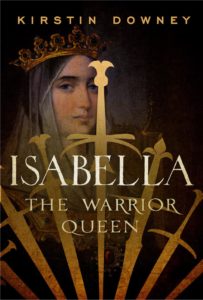Lecture Date: March 21, 2023
The Community Bank of the Chesapeake Lecture

At a time when Christianity appeared to be dying out and the Ottoman Empire was aggressively expanding, a young princess was born into obscurity in a remote village in the weak and splintered kingdom of Castile.
Inspired in her youth by tales of Joan of Arc, she grew into a devout young mother who seized the throne, unified her people, led them to victory on the battlefield and paved the way for Spain to become, in the 16th century, the largest and most far-flung empire the world had ever known.
One of the most significant monarchs of all time, her controversial legacy survives in the 500 million people who speak Spanish as their first language and the 1.3 million who practice Catholicism.
Isabella’s pivotal and strategic role would become immortalized in the popular game of chess, where her long journeys across Spain's vast plains and mountains made her the model for the most important player in the game--the queen.
Half-Portuguese through her mother and the great-niece of the Prince Henry the Navigator, Isabella sponsored nine separate expeditions to the New World, including the four most famous by Italian navigator Christopher Columbus. By the time she died in 1504, the coastline of the Americas had been mapped and the continent's wealth poured riches into the coffers of her descendants, the Hapsburgs, who used the money to gain control of much of Europe.
She also annihilated those who didn’t share her fervent Catholicism by requiring religious homogeneity, establishing a bloody inquisition against non-believers that would darken Spain's reputation for centuries.
Its injustices would help inspire a movement to ensure tolerance of all faith traditions, a revolutionary principle proposed as law by Thomas Jefferson in Fredericksburg in 1777. It ultimately became enshrined in the United States as the First Amendment guarantee of religious freedom.
Further Reading Resource List provided by CRRL
Speaker: Kirstin Downey

Kirstin Downey is the oldest daughter of a ship captain and spent much of her childhood moving from place to place, including Hawaii and the Panama Canal Zone, developing a fascination with global trade and international economics. She studied journalism at Pennsylvania State University and then wrote for newspapers in Florida and Colorado before joining the staff of the San Jose Mercury, covering business in Silicon Valley.
She became a staff writer for the Washington Post in 1988. In 2000, Downey was awarded a Nieman fellowship at Harvard University, where she studied American economic history at Harvard Business School and participated in the Harvard Trade Union Program, where young labor activists are trained to become leaders in the movement. The fellowship also gave Downey the opportunity to focus full-time on research for her book about Frances Perkins.
In 2008, Downey shared in the Pulitzer Prize awarded to the Washington Post staff for coverage of the campus slayings at Virginia Tech. She left the Washington Post in 2009 to focus on finishing her biography of Frances Perkins, The Woman Behind the New Deal: The Life of Frances Perkins, FDR’s Secretary of Labor and His Moral Conscience, published by Nan A. Talese/Doubleday.
She researched and wrote Isabella the Warrior Queen between 2009 and 2014. It was published on October 28, 2014.
Downey is married to Neil Warner Averitt, and together they have five children.